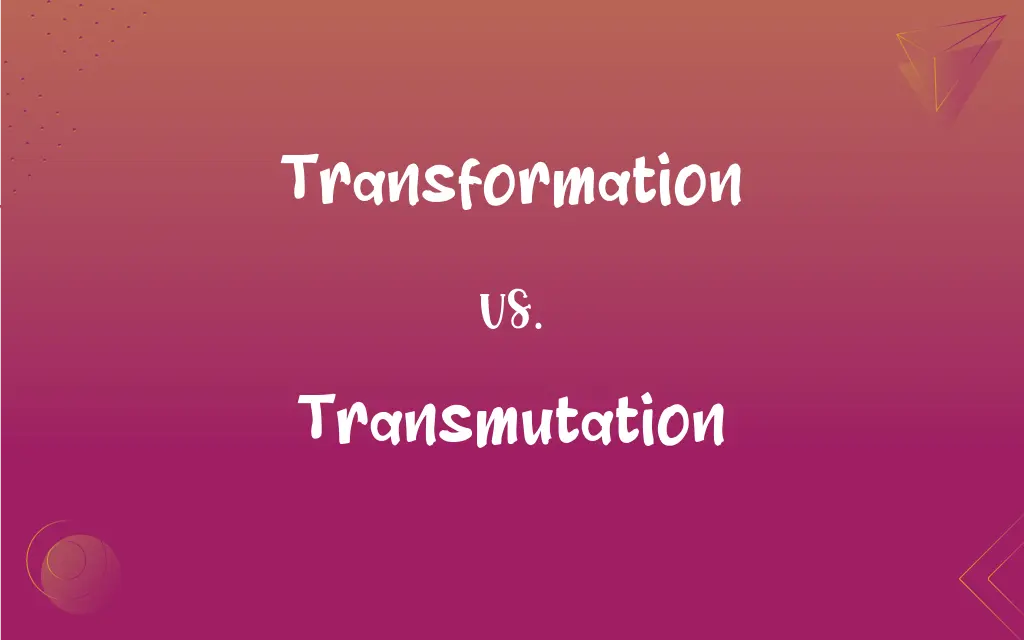Transformation vs. Transmutation: What's the Difference?
Edited by Aimie Carlson || By Janet White || Published on February 14, 2024
Transformation involves a change in form, structure, or appearance, while transmutation specifically refers to changing one element into another, especially in nuclear physics or alchemy.

Key Differences
Transformation is a broad term that encompasses any significant change in form, structure, or appearance. This change can be physical, metaphorical, or conceptual. Transmutation, however, is a more specific term, traditionally used in alchemy to describe the conversion of one substance, particularly a base metal, into another, such as gold. In modern science, it refers to changing one element into another, especially in nuclear reactions.
In biology, transformation refers to the genetic alteration of a cell by introducing foreign DNA. In psychology, it describes significant changes in behavior or perspective. Transmutation, in the context of nuclear physics, refers to the change of one chemical element into another through nuclear reactions.
Transformation can occur on various scales, from minor to revolutionary, and can be reversible or irreversible. Transmutation, especially in its nuclear form, involves changes at the atomic level and is generally irreversible.
Historically, transmutation was a goal of alchemists, seeking to turn base metals into precious ones. Transformation has always had a broader usage in various disciplines. In modern times, transmutation is primarily used in physics, while transformation is used across disciplines including technology, business, and art.
Transformation is often used metaphorically to describe personal growth and development. Transmutation, while it can have metaphorical uses, is more commonly associated with its literal scientific meaning, especially in the context of nuclear chemistry.
ADVERTISEMENT
Comparison Chart
Definition
Change in form, structure, or appearance
Changing one element or substance into another
Field of Use
Broad usage across various fields
Primarily used in nuclear physics and historical alchemy
Scale of Change
Can vary from minor to major
Atomic level, typically major and irreversible
Historical Context
Broad historical application
Primarily in alchemy for converting metals
Symbolism and Metaphorical Use
Frequently used metaphorically
Less frequently used metaphorically
ADVERTISEMENT
Transformation and Transmutation Definitions
Transformation
Adoption of a new character or nature.
The company's transformation included a new business model.
Transmutation
The action of changing or the state of being changed into another form.
Nuclear transmutation involves changing one element into another.
Transformation
A process of change in a particular direction.
Digital transformation is reshaping how businesses operate.
Transmutation
A change into a different substance or element.
Transmutation of radioactive elements occurs in nuclear reactors.
Transformation
A thorough or dramatic change in form or appearance.
The city's waterfront underwent a major transformation.
Transmutation
A change at the atomic level from one element to another.
Transmutation is key in understanding stellar nucleosynthesis.
Transformation
A significant change in form or structure.
The transformation of a caterpillar into a butterfly is remarkable.
Transmutation
In alchemy, changing base metals into gold or silver.
Medieval alchemists sought the secret of transmutation.
Transformation
Genetic alteration of a cell by introducing foreign DNA.
Bacterial transformation is a key tool in genetic engineering.
Transmutation
The conversion of one chemical element into another.
Transmutation is used in creating medical isotopes.
Transformation
The act or an instance of transforming
Her difficult transformation of the yard into a garden.
Transmutation
The act or an instance of transmuting; transformation.
Transformation
The state of being transformed
Impressed by the transformation of the yard.
Transmutation
The state of being transmuted.
FAQs
What does transformation mean?
It refers to a significant change in form, appearance, or structure.
Can transformation occur in nature?
Yes, natural transformations are common, like the metamorphosis of insects.
What is transmutation in physics?
It's the conversion of one element into another, especially in nuclear reactions.
Was transmutation achieved in alchemy?
Historical attempts were made, but true transmutation wasn't scientifically possible.
Do transformations always involve physical changes?
Not necessarily, they can be conceptual, metaphorical, or behavioral.
Can transformation be reversed?
Depending on the context, some transformations can be reversible.
How is transformation used in technology?
It refers to significant changes in technology, like the transition to digital platforms.
Is transmutation possible in modern science?
Yes, especially in nuclear chemistry and physics.
What’s an example of transmutation in everyday life?
Radioactive decay is a natural form of transmutation.
How did alchemists view transmutation?
As a mystical process to convert base metals into precious ones.
What is the importance of transformation in art?
It often represents the process of creating something new or interpreting something differently.
Are transformation and transmutation interchangeable terms?
No, they have different meanings and applications, especially in scientific contexts.
Are transformations important in personal development?
Yes, they often symbolize personal growth and changes in perspective.
Is transmutation a natural process?
It can be, especially in the form of radioactive decay.
Can transformation happen in ecosystems?
Yes, ecosystems can undergo transformations due to environmental changes.
Does transmutation have any medical applications?
Yes, in producing medical isotopes through nuclear transmutation.
Is transformation a gradual process?
It can be either gradual or sudden, depending on the context.
What role does transmutation play in nuclear reactors?
It's involved in the changing of elements through nuclear reactions.
Can transformation be applied to organizations?
Yes, organizational transformations involve major changes in operations or strategies.
How does transformation relate to innovation?
Innovation often drives transformation by introducing new methods or ideas.
About Author
Written by
Janet WhiteJanet White has been an esteemed writer and blogger for Difference Wiki. Holding a Master's degree in Science and Medical Journalism from the prestigious Boston University, she has consistently demonstrated her expertise and passion for her field. When she's not immersed in her work, Janet relishes her time exercising, delving into a good book, and cherishing moments with friends and family.
Edited by
Aimie CarlsonAimie Carlson, holding a master's degree in English literature, is a fervent English language enthusiast. She lends her writing talents to Difference Wiki, a prominent website that specializes in comparisons, offering readers insightful analyses that both captivate and inform.







































































